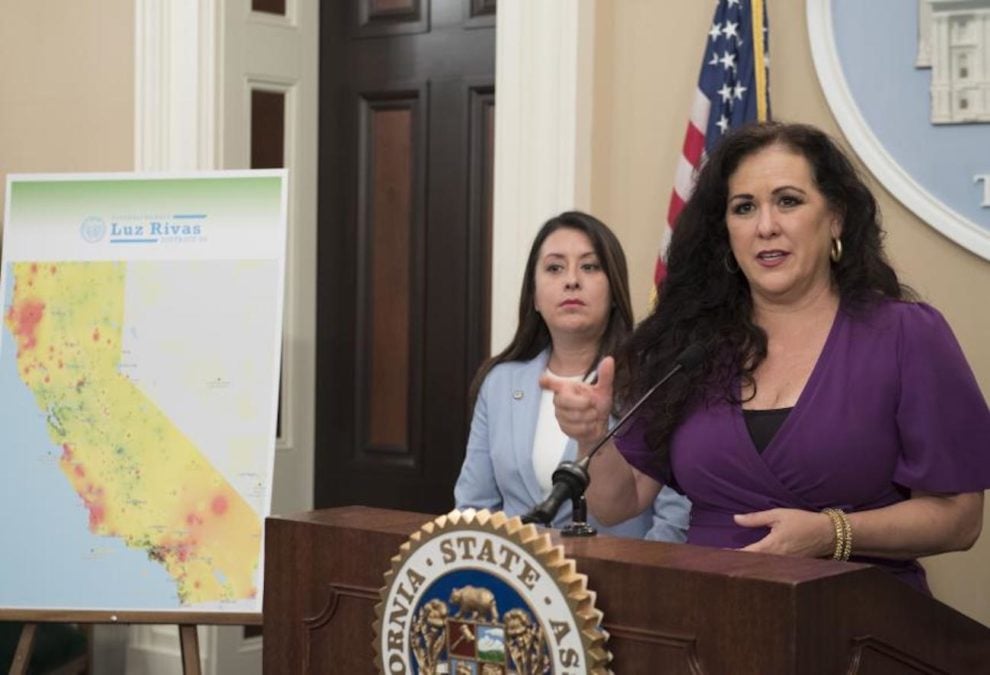
Assemblywoman Lorena Gonzalez, right, at a June 12, 2019, press conference with Assemblywoman Luz Rivas, was criticized Friday by Equality California for blocking Senate Bill 145, which would help the LGBTQ community. Photo: Office of Lorena Gonzalez.
UPDATE: SB 145 passed both houses of the California legislature and was sent to Gov. Gavin Newsom.
A California bill with bipartisan support that would have erased a sentencing disparity that has disproportionately harmed gays and lesbians to register on the state’s sex offender list has been blocked.
Prosecutors, public defenders, and police chiefs also support Senate Bill 145, which had cleared the Senate and awaited a hearing in the Assembly Appropriations Committee.
But Committee Chairwoman Lorena Gonzalez (D-San Diego) recommended that the legislation be converted into a two-year bill, which the committee approved Friday. That means the bill won’t be eligible for consideration until next year.
Equality California upset
In a statement, Rick Zbur, executive director of Equality California, the LGBTQ advocacy group and a co-sponsor of the bill, criticized Gonzalez’s decision to block the bill.
“We are extremely disappointed with Assembly Appropriations Committee Chair Lorena Gonzalez for allowing an outdated law that discriminates against LGBTQ people to remain on the books,” he said. “Law enforcement, sexual assault survivors and civil rights groups alike support this bipartisan bill because it would make California’s sex offender registry more effective and end blatant anti-LGBTQ discrimination.”
Gonzalez could not be reached for comment.
Unfair law
Under California law, if an adult is convicted of consensual vaginal intercourse with a minor between 14 and 17 years old, and the adult is within 10 years of the minor, a judge has the discretion during sentencing to decide if the person should be listed on the sex offender registry.
For example, if a heterosexual man, who is 18, has vaginal intercourse with his girlfriend, 17, he can be arrested, charged, and convicted of a crime, but is not required to register as a sex offender. The judge makes that determination.
On the other hand, if a gay man, who is 18, has sex with his boyfriend, who is 17, the judge’s hands are tied because the law says he must place the adult on the sex offender list, regardless of the facts in the case.
Senate Bill 145
Sen. Scott Wiener, the author of Senate Bill 154, told the San Francisco Chronicle, that current law is “such horrific homophobia. It’s irrational, and it ruins people’s lives.”
SB 145 would only amend California law to list other types of intercourse. Those acts would include oral and anal sex and digital penetration. The bill does not include forcible acts.
Bill supporters
SB 145 is also co-sponsored by the Los Angeles County District Attorney’s Office and supported by the ACLU of California, California District Attorney’s Association, Lambda Legal, California Police Chief’s Association, California Public Defenders Association, and the California Coalition Against Sexual Assault.
Lorena Gonzalez called out
Zbur, in the statement, also called out Gonzalez, saying that she “has stood in the way of LGBTQ civil rights legislation and demonstrated a lack of understanding of LGBTQ civil rights issues.
“The impact of today’s decision is neither hypothetical nor abstract,” he said. “When this Committee and this Chair refuse to listen to law enforcement, sexual assault survivors and civil rights organizations, Californians suffer as a result.”
